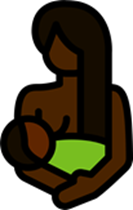Your baby shows you signs to let you know when they are hungry. These are called feeding cues. These cues get stronger as your baby gets hungrier, until they cry as a last signal to you.
The more you get to know your baby, you'll start to notice their personal feeding cues.
Common Feeding Cues
Below are some common feeding cues. Click the picture for more information.
If you notice these signs, try and feed your baby as soon as possible.
If your baby has started crying, they may be very upset which can be stressful and can make it more challenging to get them attached to the breast.
If this happens, take time to calm your baby down and then try again.
Why Does My Baby Feed A Lot?
Remember that babies are born with tiny tummies. They only need to feed little and often in the first few days so they show these feeding cues a lot. You cannot overfeed your baby as they will stop when they are full.
Your baby may ask to go to the breast for comfort and love, not just food. Feed your baby when they show you that they are hungry, when your breasts feel full, for comfort, pain relief, love or warmth. This will all help to build your milk supply and baby's development.
Responsive breastfeeding or demand feeding is when you pl ace your baby to the breast every time they show feeding cues. It is when you let your baby lead the way and tell you when they need to have food.
ace your baby to the breast every time they show feeding cues. It is when you let your baby lead the way and tell you when they need to have food.
A newborn baby's stomach is only the size of a walnut, so they need to feed little and often. Your baby can have a good feed and be hungry again quite quickly afterwards.
The idea is that you respond to your baby's feeding cues. Breastfeeding is not only about your baby getting enough milk. Your baby feeds for comfort and reassurance, too.
Babies go through different patterns of feeding as they grow. Letting them feed when they need to will ensure they're content and getting the milk they need, when they need it. Responsive feeding will also stimulate your milk supply.
Responsive feeding is also about your needs. You may want to offer a breastfeed if your breasts are uncomfortably full, if you need to fit in a feed around other commitments, or if you just want to sit down and enjoy spending some time with your baby.
If your baby is less than 28 days old you can contact your local midwifery team or you can contact the Healthy Child Programme at any time following your baby's birth by calling Just One Number on 0300 300 0123 or texting Parentline on 07520 631590.
Our opening hours are 8am-6pm Monday to Friday (excluding bank holidays) and 9am-1pm on Saturdays.
Norfolk Healthy Child Programme has a team of infant feeding champions who can contact you by video call/telephone initially to discuss your questions and refer you to further help if required. All of our staff are trained to Unicef standards to provide you with the best possible breastfeeding support and advice.
It may help in the first instance to look again at our page on Positioning and Attachment or read the Essential Guide to Feeding & Caring for your Baby.
Norfolk’s Early Childhood and Family Service (ECFS) offers support for all parents and carers with children aged 0 to 5 years.
To speak to other Norfolk parents and carers, you can join our online community forum below.
Also in this section...